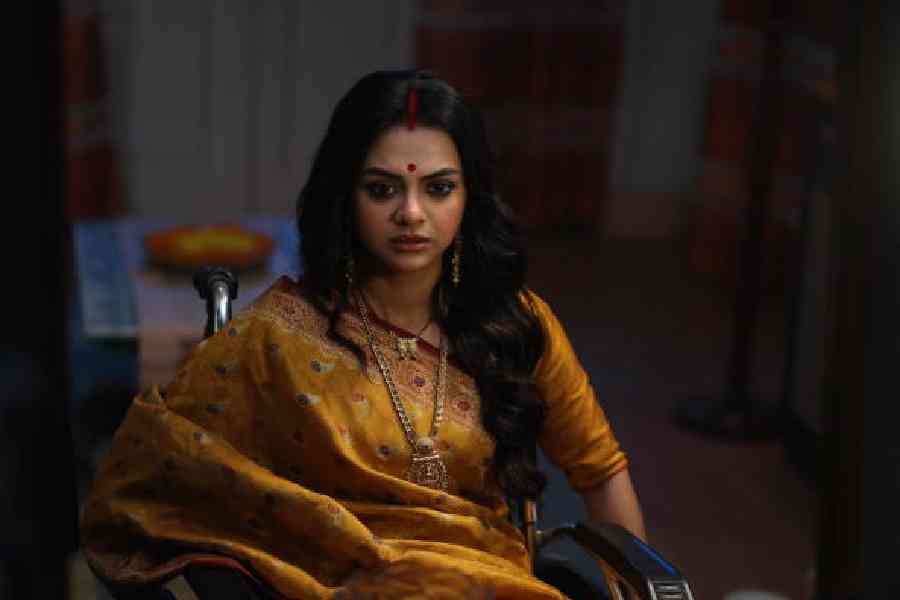Actress Solanki Roy plays the lead in Boka Bakshote Bondi, a psychological thriller directed by Debaloy Bhattacharya. A t2 chat with the actress of the web series which is now streaming on Hoichoi.
You have worked in a few other web series before this. What were your main reasons for agreeing to act in Boka Bakshote Bondi?
All of the characters that I have played so far have been very different from one another. This time, I was supposed to play the character of an actor, which I found very interesting. Apart from that, I am a fan of Debaloy Bhattacharya’s work and his vision as a director. So when he called me up to offer me the role, I was only too happy to accept it.
Since you have worked with director Debaloy Bhattacharya earlier as well, how would you assess your working dynamics with him?
When I worked with him for the first time (on Montu Pilot), I was comparatively new. It was a challenging role and mentally stressful. Since it was just my second series, I was not sure whether I would be able to pull it off. But Debaloyda had immense faith in me and motivated me so well that my character turned out brilliantly. In fact, it is still one of the most-loved shows on Hoichoi. So I have always been an admirer of his style of work and I love the way he thinks. Yet he is a very chilled-out person. He gives a lot of space to his actors. He encourages them to add their ideas and inputs to the script.
Now after five years, I have matured as an actor and he too has evolved as a director. What I realised this time is that it is a liberating experience to work with him. The level of comfort actors enjoy while working with him is truly admirable. Not just me, but every actor would be happy to work for a director like him.
What are the core values and conflicts in your character? What did you find tough to portray?
Opola, my character, has been an actor for the last 20 years. Though she initially enjoyed it, as she grew older, the rigours of the job along with the punishing schedules made her want to give it up. Unfortunately, because of her financial responsibilities, she could never do so. This story shows how she gets trapped inside her character on the day she decides to quit her acting job. So this story is about the alienation of Opola, who feels isolated from the real world. She is conflicted between her real and her screen selves, and is in a constant dilemma because the line separating the two lives gets blurred for her.
The real problem I faced occurred because the shooting schedules were not designed in a linear way. It never happened that we shot Opola’s scenes continuously for a day and then Sandhyamani’s (the part played by Opola in a television serial) at a stretch. On top of that, there were some scenes where Sandhyamani had to utter lines that would be appropriate when said by Opola and vice versa. These bits were a little confusing for me. Thankfully Debaloyda said that he wanted this confusion to show in my character, so that was helpful in a way. But the constant switch between the two characters was difficult to adapt to.

Solanki in Bokabaksho Te Bondi
Do you think Opola, your character, bears any resemblance to you? Or, how is she different from you?
The biggest difference between Opola and myself is that Opola does not want to act anymore. After so many years, she is tired of acting. Also, she was never an actor by choice; it was thrust on her when she was a kid. As for me, I have chosen this profession for myself. I love being an actor and I want to continue acting for as long as I live. Apart from that, Opola’s family and socio-economic backgrounds are very different from mine.
But there are certain similarities also. Both she and I have been working in the television industry for many years. And strangely enough, like Opola, after I played a certain character for a long period, say for two years, I also started to identify myself with that character, having almost lived her life continuously for that time. There have also been times when my personal decisions have been influenced by the character I was playing.
Share your views about the title of Boka Bakshote Bondi.
This was not the first and only title for the series. It had a different working title, another which was written on top of the script that was given to me. But none of them seemed to justify the theme of the story. Then Sohini, the executive producer of Hoichoi, came up with this name and everyone loved it instantly. It completely resonates with the fate of Opola, who gets trapped physically and emotionally in the character that she plays. Also, the title recalls the famous song (Prithibita naki chhoto hote hote) by Mohiner Ghoraguli, which too speaks of alienation, like our series.
So Opola suffers a mental health crisis because she is trapped by her ‘bokabaksho’ character?
Yes of course, if one’s identity gets trapped or lost in one’s work-space, then that is clearly a mental health crisis. And in Opola’s case, it hits really hard.
How was the issue of mental health dealt with in the series?
I think it was very well represented. There was no preaching or sermonising as the series is intended as an entertaining, psychological thriller, but the message was put across subtly, simply by representing what happened to Opola and why it happened to her.
But more than television, young people are hooked to their phones nowadays. And if anything consumes you more than you consume it, then that becomes a threat.
What is your advice to the young girls on their sense of identity and how should they work on it?
This is something that worries me also. As I said, the youth are constantly on their phones, and to not get affected by what they see on it is impossible. What I want to tell them is that they should realise that most apps are tools to sell products and the world we see on social media is virtual, not real. Their identity is precious and they should celebrate it with real friends with whom they can have real communication instead of depending on virtual ‘likes’ and ‘followers’ to validate themselves.










